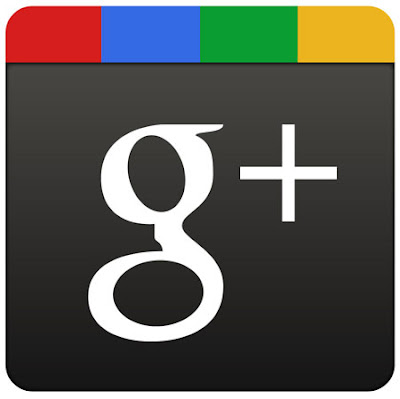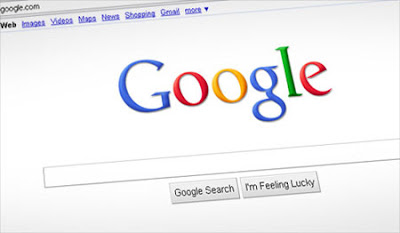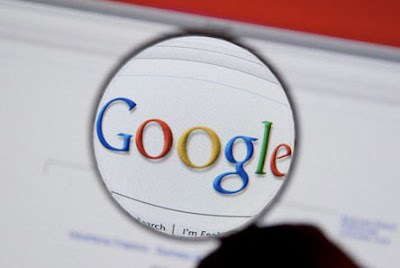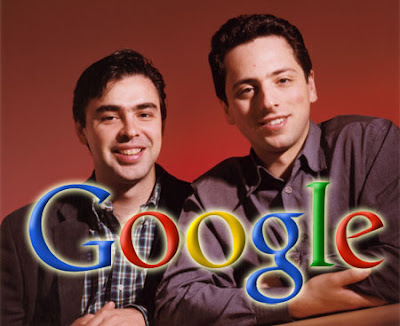Wall Street Journal
by DOUGLAS EDWARDS
July 16, 2011
An insider recounts the early days: the bizarre job interview, April Fools' pranks that enraged users, roller hockey, platters of sushi—and the uneasy leap to the mainstream.
In November 1999, Douglas Edwards became fledgling Google's first "brand manager," making him employee No. 59. In this excerpt from his new book, "I'm Feeling Lucky," Mr. Edwards gives an inside view of the company's early days, starting with his job interview with co-founder Sergey Brin, then 26 years old.
Cindy McCaffrey, director of public relations, brought me back to the conference room to wait for Sergey. I wasn't nervous. Sergey was about the age of my favorite T-shirt (I was 41) and a Russian by birth. I had lived in Russia. I spoke some Russian. I had Russian friends.
I felt unusually confident that the interview would go well. Perhaps I would become his mentor and we would toast each other's health with fine Siberian vodka. Sergey showed up wearing roller-hockey gear: gym shorts, a T-shirt and in-line skates. He had obviously been playing hard. I had known better than to wear a tie, but he took office casual to a new level.
Sergey pored over my résumé and began peppering me with questions. "What promotion did you do that was most effective?" "What metrics did you use to measure it?" "What types of viral marketing did you do?"
"How much do you think a company our size should spend on marketing?" Sergey asked me. Based on his earlier questions, it was easy to guess what he wanted to hear from me. "I don't think at this stage you should spend much at all," I said. "You can do a lot with viral marketing and small budgets."
He nodded his agreement, then asked about my six months in Siberia, casually switching to Russian to see how much I had picked up. Finally, he leaned forward and fired his best shot, what he came to call "the hard question."
"I'm going to give you five minutes," he told me. "When I come back, I want you to explain to me something complicated that I don't already know." He then rolled out of the room toward the snack area. I looked at Cindy. "He's very curious about everything," she told me. "You can talk about a hobby, something technical, whatever you want. Just make sure it's something you really understand well."
I reached for a piece of scrap paper as my mind raced. What complicated thing did I know well enough to describe to Sergey? I decided to go with the general theory of marketing, which was fresh in my mind, because I'd only learned it recently.
One of my dirty little secrets was a complete lack of academic preparation for the business world. Fortunately, my boss at the San Jose Mercury News, where I was working as a brand manager, had a Harvard MBA and a desire to drive some business theory into my thick skull. She had given me a bunch of her old textbooks, along with strong hints that I should spend time reading them. I began regurgitating everything that I could remember onto the paper in front of me: The five P's (or was it six?), the four M's, barriers to entry, differentiation on quality or price.
By the time Sergey came back, I had enough to talk for 10 minutes and was confident I could fill any holes with the three Bs (Buckets of Baffling Bulls—). I went to the whiteboard and began drawing circles and squares and lots of arrows. I was nervous, but not very. Sergey bounced on a ball and asked questions that required me to make up things on the spot.
"What's more important: product differentiation or promotion?"
"How does the strategy change if the price is zero?"
He seemed to be paying attention, and I began enjoying myself. We were developing a special rapport! Clearly, he wanted to hear what I had to say and valued my opinions. Later I found out that Sergey did this with everyone he interviewed. An hour wasted with an unqualified candidate wasn't a total loss if Sergey gained insight into something he didn't already know.
The light was fading by the time I finished, and Sergey invited me to join the staff for dinner, which was being brought into a small kitchen across from the conference room. A crowd of hungry engineers bounced from plate to plate with chopsticks picking at a large selection of sushi.
"We just hired a chef, so this is a temporary set-up," Sergey told me. "And we've got a couple of massage therapists coming in as well."
A warning light flashed in my head at that. This was the guy who didn't think there should be a marketing budget, and he had hired a chef and two massage therapists? But then I saw the platters of fatty tuna and shrimp and salmon and yellowtail. I grabbed some chopsticks and began loading my plate. Concerns about a business plan and revenue streams and organizational structure faded away.
Google met most of my requirements. It offered at least the appearance of superior Internet-related technology, some eccentric genius types, funding that should last at least a year and a fun consumer brand that I could help to develop. Two weeks later, on Nov. 29, 1999, I started work as Google's online brand manager.
You would have needed uncanny foresight or powerful pharmaceuticals to envision Google's success in 1999. Or maybe just money to burn. Kleiner Perkins and Sequoia Capital had something, because the two venture capital firms invested $12.5 million each, leading cynics in the Valley to define "Googling" as "getting funding without a business plan."
It's just as well that I hadn't realized how fragile Google truly was as I set up the meeting to discuss next steps for my marketing plan.
"The most important thing to consider," I began, "is that our own internal research shows our competitors are beginning to approach Google's level of quality. In a world where all search engines are equal, we'll need to rely on branding to differentiate us from everyone else." The room grew quiet.
I looked around nervously. Had I said something wrong? Yes. Not just wrong but heretical to engineers who believed anything could be improved through the iterative application of intelligence. Co-founder Larry Page made my apostasy clear. "If we can't win on quality," he said quietly, "we shouldn't win at all."
Sometimes a founder put forth "a good idea."
"I have a good idea," Sergey informed marketing manager Susan Wojcicki a couple of weeks after I started. "Why don't we take the marketing budget and use it to inoculate Chechen refugees against cholera. It will help our brand awareness, and we'll get more new people to use Google."
Our company was barely a year old at the time. We had no real revenue. Spending a million dollars of our investors' money on a land war in Asia would indeed be a revolutionary approach to growing market share.
Looking back a dozen years later, I kind of get Sergey's perspective. Saving lives was a better use of our budget than running ads, which just annoyed people to no effect—and were therefore evil. Why not make a big donation to a humanitarian cause and build awareness by doing good? It had all the classic elements of a Sergey solution: a wildly unconventional approach to a common problem, technology harnessed to improve the human condition, an international scope.
Sergey didn't ask my marketing colleague Shari or me what we thought of his idea. He knew that we would have ridiculed it. Instead, he turned to Susan, an early member of the inner circle. Sergey had met her family (he'd later marry her sister), and Susan understood Sergey well enough not to dismiss his outlandish suggestions out of hand.
Instead, she went to gather data, which in this case meant asking her mom, a teacher in Palo Alto. As an educator, Susan's mother carried authority with Sergey, and when she confessed to being confused about our plan to support a rebel army in Russia, it took some of the wind out of his sails.
He had a backup plan, though. "What if we gave out free Google-branded condoms to high-school students?"
Sergey asked Shari and me to investigate other charitable promotions along these lines, and we dutifully did, but it wasn't lost on us that our opinions had only been sought as an afterthought.
April was right around the corner. My first April at Google. My first Google April Fools' joke.
April Fools' Day would become a perennial black hole in my calendar, a gravity well into which my attention would be sucked from increasingly great distances in time. Sergey, on the other hand, loved April Fools'. When it came to April Fools', he dynamited decorum and put moderation to the torch.
My idea for our first prank was "ante-temporal search," a breakthrough development that anticipated user requests. The tone was heavily geekish, but Susan liked it. Sergey thought it was overdone (akin to the pope saying you're overly religious), but encouragingly, he said it had potential. An engineer pinned the name "MentalPlex" on our new mind-reading technology.
That settled, I hashed out the text for a link on the home page and a dozen error messages that would be displayed randomly if someone entered a query in the MentalPlex search box.
Someone pointed out that with our newly launched foreign-language interfaces, we could extend the joke beyond English. "One of the error messages should say that MentalPlex has detected foreign thoughts," she suggested, "and then we can translate the interface text on the results page into German."
The joke went up on Friday night. Soon Google users would see a spinning cartoon spiral on our homepage inviting them to try MentalPlex. I was relieved that we'd made the deadline. I was also terrified.
As soon as we hit Submit on the push, I started compulsively refreshing my inbox to check for feedback from users. At 8:01 the first email arrived. "Google is great!" was the header. More emails started trickling in. People were surprised. They didn't think search engines had a sense of humor. They liked it. They were: LOL. ROFL. ROFLMAO. A chorus of hosannas sounded over the next few hours.
"Turn it off. It thinks I'm German." The off-key refrain caught my ear.
"I found MentalPlex mildly amusing, but the different languages on the results page make it harder to use. The joke gets old very quickly."
Discordant voices increasingly sang about confusion and annoyance.
Unfortunately, it was a Friday night. The engineering staff were with Sergey at Zibibbo, a trendy restaurant 20 minutes away in downtown Palo Alto. No one in the office was authorized to make changes to the joke.
We were taking a pounding on email. Finally, an engineer stepped in. Now our unwanted results were in Portuguese. The engineers thought the joke was just too funny to eliminate entirely, so they simply shifted the interface to another language.
Complaints kept coming. Though the tone was less virulent, users were still unhappy that they couldn't navigate the site easily. I had worked at Google long enough not to be intimidated by an org chart. I called Sergey. It was hard to hear over the background noise of rowdy engineers in a crowded restaurant, but I could tell he was surprised when I insisted that we drop all the foreign-language results.
Sergey reluctantly agreed. It was midnight before all the foreign-language text was stripped off the site.
"A not-insignificant fraction of our users are complete idiots," groused one engineer, "if they can't figure out how to use our site, just because it's all in Portuguese." Google had clearly crossed the gap from serving the tech elite to playing in the mainstream market—an online segment that he knew to be densely populated with the clueless.
"I'm more worried that we got spooked by a little negative feedback," said another engineer. "We backed off the playfulness that's an important part of Google. We watered down our April Fools' joke to make it less invasive. I guess that's what happens as we grow up—we become a more conservative company." He did not see that as a positive development.
I've heard the speculation about Google since I've left. That it's a monopoly. That it's tracking users. That it's in cahoots with the government. That it spies on people. That it's evil.
Well, maybe it is all that. I haven't worked there in more than five years. Things change. But based on the people I knew during my time in the Plex—many of whom still put in long hours perfecting a product used by millions every day—I'd say that's highly unlikely.
Is Google secretive? No question. Arrogant? Maybe. Tone-deaf to the concerns of the very users it claims to serve? Occasionally. But evil? I don't think so.
I started my career working at ad agencies. It was fun, challenging and potentially well-paying. I quit because I didn't like the idea that I might have to sell something I didn't believe in. I worked in public broadcasting and then newspapers, where I found co-workers who sacrificed material rewards to be part of something more connected to the common good than selling someone else's products. I got that same sense at Google, but with greater intensity and urgency. And stock options.
This was no institution continuing a long tradition of public service. This was a headlong rush to reshape the world in a generation. And therein lies the company's biggest flaw in my estimation—impatience with those not quick enough to grasp the obvious truth of Google's vision.
"When were we ever wrong?" Larry once asked me.
Not often. But "not often" is not never. If Google's leaders accepted that reality, they might understand why some people are unwilling to suspend skepticism and surrender to Google's assurances that the company can be trusted.
After Google, I find myself impatient with the way the world works. Why is it so hard to schedule a recording on my DVR? Why aren't all the signal lights synched to keep traffic flowing at optimum speed? Why, if I punch in my account number when I call customer service, do I have to give it to them again when I get a live person? These are all solvable problems. Smart people, motivated to make things better, can do almost anything. I feel lucky to have seen firsthand just how true that is.
The Unlikely Making of the Google 'Doodle'
One of the convictions that I brought with me to Google was that you needed to present your company's graphic signature in a monomaniacally consistent manner; to pound it into the public consciousness with a thousand tiny taps, each one exactly the same as the one before.
So when Sergey reminded me that he wanted us to play with Google's signature home-page graphic in 1999, I put my foot down. This was not only the most prominent placement of our logo; it was the only placement of our logo. We weren't advertising on TV or on billboards or in print. The logo floating in all that white space was it.
Sergey didn't see the big deal. He had changed the logo twice during Google's infancy, adding a clip-art turkey on Thanksgiving in 1998 and putting up a Burning Man cartoon when the staff took off to explore nakedness in the Nevada desert. But now Google was a real company, I told him. Real companies don't do that.
Even as we argued, Sergey enlisted webmaster Karen White to resurrect the turkey for Thanksgiving, create a holiday snowman in December and festoon the logo with a hat and confetti for New Year's 2000.
"What about aliens?" he asked. "Let's put aliens on the home page. We'll change it every day. It will be like a comic strip that people come back to read."
I tried not to be condescending. I gave him my spiel about consistency of messaging and uniform touchpoints and assured him that it wasn't just my opinion; it was the consensus of marketing professionals world-wide. I knew I had finally convinced him when he stopped asking me about it.
I was wrong. Sergey wasn't convinced; he just didn't like repeating himself. So he turned to marketing manager Susan Wojcicki, who found illustrator Ian Marsden and put him to work. In May 2000, Ian created the first Google doodle. It featured—surprise, surprise—aliens making off with our logo.
Our users loved the randomness of the logo artwork and sent us dozens of appreciative emails. Google's brilliant strategy of humanizing an otherwise sterile interface with cute little cartoon creatures was an enormous hit.
It was so blindingly obvious that I was right, yet I was so clearly wrong. Google did that to you—it made you challenge all your assumptions and experience-based ideas until you began to wonder if up was really up, or if it might not actually be a different kind of down.























